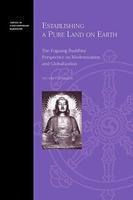
Book Summary
With more than 150 temples in thirty countries, Foguangshan has developed over the last thirty-five years into one of the world's largest and most influential Chinese Buddhist movements. The result of two years of fieldwork in Foguangshan temples in Taiwan, the U.S., Australia, and South Africa, this volume is an unprecedented examination of the inner workings of a dynamic and innovative religious movement. Based on direct observations, private interviews, and careful textual and historical analysis, Stuart Chandler looks at the challenges faced by Foguangshan's leader, Master Xingyun, and his followers as they try to adhere to traditional practices and values while tapping into the advantages afforded by modern, global society. Foguangshan's slogans ("Humanistic Buddhism" and "Establishing a Pure Land on Earth") are placed in historical context to reveal their role in shaping the group's attitudes toward capitalism, women's rights, and democracy, as well as toward the traditional Chinese virtue of filial piety and the Chinese Buddhist concept of "links of affinity" (jieyuan). Chandler goes on to analyze Foguangshan's educational system and its understanding of how precepts relate to contemporary problems such as abortion and capital punishment. The book's final chapters consider the cultural and political dynamics at play in Foguangshan's ambitious attempt to spread Humanistic Buddhism around the world and how its followers have reinterpreted the Buddhist ideal of homelessness to take advantage of the spiritual potentialities of people's lives as global citizens.
Book Details
| Book Name | Chandler: Establishing A Pure Land |
| Author | Stuart Chandler |
| Publisher | University Of Hawaii Press (Mar 2004) |
| ISBN | 9780824827465 |
| Pages | 456 |
| Language | English |
| Price | 4837 |








